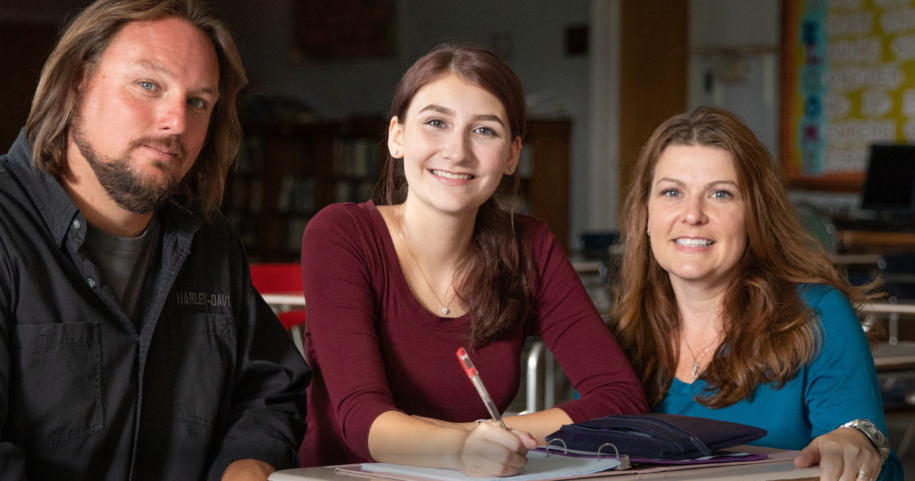
David and Amy Carson both graduated from Bangor Christian Schools, housed in a tidy, red brick building in Maine. In addition to core academic subjects like reading and math, the school emphasizes a “biblical worldview.” Chapel meets every Thursday, and students are required to take Bible classes.
So, when their daughter, Olivia, was born they knew where they would send her to school.
“She started there in day care and then went to pre-K and straight through,” recalled Carson, who, with her husband, proudly watched Olivia cross the graduation stage with her high school diploma in hand from their alma mater. “Only one other kid had been there as many years.”
Even though their daughter is headed to college, the Carsons hope their involvement in a legal challenge that reaches the U.S. Supreme Court on Thursday will end what they consider discrimination against students who attend religious schools.
The Carsons live in Glenburn, a town with a population of 4,468 located near the center of the state and about 8.5 miles from Bangor. Though a district school offers an education to students in kindergarten through eighth grade, the town lacks a high school. Once students reach that level, they must look for a school in a neighboring town. A state program offers financial assistance to families who live in towns without a high school, even if they choose a private school.
But when Olivia reached ninth grade and became eligible, the Carsons and other families were barred from receiving any assistance. That’s because Maine law limits the program to secular schools. Schools that teach religion, or engage in religious activities such as chapel meetings, can’t be part of the program, called a town tuition program.
“That’s kind of ridiculous,” Carson said, adding that Bangor Christian’s annual tuition, which totals $5,450 per child (with discounts for multiple children) costs less than many of the other schools that are allowed to participate. “They would be paying twice as much as they would pay to send her to Bangor Christian.”
The Carsons, who own a residential construction firm, have always had to pay Olivia’s tuition and fees out of pocket. While they never considered the situation fair, they managed. They were concerned, however, about the kids who disappeared from class because their families could no longer afford tuition.
That’s why, when the Carsons, who were invited three years ago to help challenge the now 41-year-old policy, decided to sign on.
“Families were hesitant to get involved, so David said, ‘Well, we’re doing it,’” Carson said.
For the past three years, Carson v. Makin has moved through the court system, with the U.S. Circuit Court of Appeals in the 1st Circuit siding with the state in October. A three-judge panel said that the program’s limited scope separated it from other programs in which courts ruled that those bans were unconstitutional.
Maine’s ban, they said, was based on the schools’ use of state aid for religious activities, not merely the school’s status. The U.S. Supreme Court settled the status question last year when it ruled in Espinoza v. Montana that a school could not be barred from participating in a state scholarship program simply for being a religious school.
For an analysis of each case, see here and here.
“The central question here remains whether parents will be able to select the best schools to meet their children’s needs—including religious schools that reinforce the values and beliefs so many of these parents seek to instill in their homes,” said Michael Bindas, senior attorney for the Institute for Justice, which is representing the plaintiffs. “The Constitution requires government neutrality toward religion, not hostility. Maine’s exclusion of religious options violates that constitutional command of neutrality.”
The high court is expected to decide in the next couple of weeks whether it will consider the case during its next term.
The Carsons hope for a victory, even though they won’t benefit personally. They want to help others who are sacrificing to send their kids to a school known for its small class sizes, strong academics and a close-knit community.
“We both grew up in families with limited funds,” Carson said. “If (our parents) had had the ability for us to go to school and not have to pay for it, it would have been a huge help to them. We’re just hoping this goes through.”



[…] Click here to view original article http://www.reimaginedonline.org […]